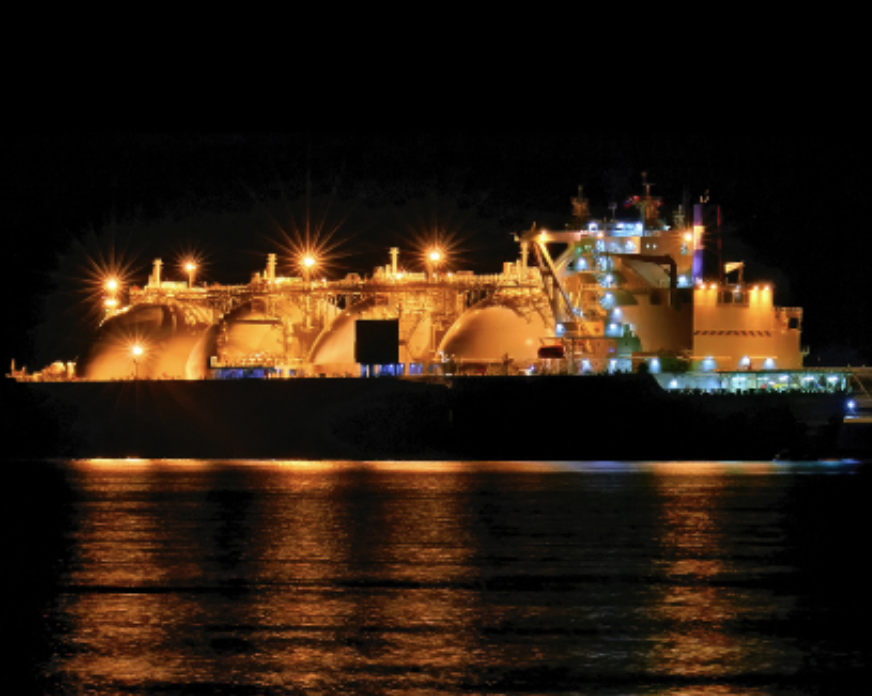A new report from the National Association of Manufacturers (NAM) finds that the Biden administration’s pause on permitting liquified natural gas (LNG) export terminals has the potential to jeopardize 900,000 jobs.
LNG is natural gas that has been cooled to a liquid state, typically around -260°F. This process reduces its volume by about 600 times, making it easier to transport and store.
LNG is primarily composed of methane (CH₄) but can also contain small amounts of other hydrocarbons. It is transported in specialized cryogenic tankers and can be re-gasified at its destination for use in electricity generation, heating, and as a fuel for vehicles.
The liquefaction process helps to facilitate international trade in natural gas, allowing countries with abundant natural gas resources like the United States to export it to regions where it is in high demand.
The report, prepared for NAM by PricewaterhouseCoopers (PwC), finds American LNG exports supported, directly or indirectly, approximately 222,000 jobs in 2023, producing more than $23 billion in labor income, $43 billion in GDP, and $11 billion in federal, state, and municipal tax revenue. By 2044, PwC projects LNG will support 516,000 to 900,000 jobs and produce $59 billion to $103 billion in labor income. PwC also projects LNG will contribute $122 billion to $215 billion in GDP by 2044, as well as $26 billion to $47 billion in tax revenue.
“With an all-of-the-above energy strategy, we don’t have to choose between national security, economic growth, and environmental protection — they go hand in hand,” NAM President and CEO Jay Timmons told FOX Business in an exclusive statement. “Today’s research highlights the massive potential we unlock when we embrace American energy production.”
However, in January, the Biden administration announced a temporary pause in permitting approval for new LNG export terminals to countries without a free trade agreement with the United States, arguing the “current economic and environmental analyses [the U.S. Department of Energy] uses to underpin its LNG export authorizations are roughly five years old and no longer adequately account for considerations like potential energy cost increases for American consumers and manufacturers beyond current authorizations or the latest assessment of the impact of greenhouse gas emissions.”
Almost 90 percent of all U.S. LNG exports went to non-free trade agreement countries in 2023.
Further, the Biden administration argues in its statement, “we have an evolving understanding of the market need for LNG, the long-term supply of LNG, and the perilous impacts of methane on our planet. We also must adequately guard against risks to the health of our communities, especially frontline communities in the United States who disproportionately shoulder the burden of pollution from new export facilities.”
According to the latest data from the U.S. Environmental Protection Agency, onshore methane emissions in the United States have fallen 37 percent from 2013 ato 2022. Significant credit for that goes to the oil and gas industries for the innovations they have voluntarily undertaken to make drill sites as safe as possible and the best practices they have implemented.
A federal court placed an injunction on the permitting pause in July, after a suit was brought against the Biden administration by a coalition of 16 states.
“Our new research makes clear that clamping down on LNG exports jeopardizes jobs and economic growth. It also forces other nations to rely on dirtier alternatives from adversarial nations like Russia, which exacerbates national security risks,” Timmons noted. “By expanding LNG export facilities, increasing natural gas production, and supporting clean energy initiatives, we can power manufacturing, improve the quality of life, boost our security and reduce emissions across the globe.”
The oil and natural gas deposits located throughout the United States are abundant, affordable, and environmentally safe, and the United States is the largest producer and exporter of LNG in the world. Moreover, these deposits can ensure the United States is the world’s largest energy producer and exporter well beyond the 21st century. As Timmons points out, the production and exportation of LNG is critical for American domestic energy security and the U.S. economy as a whole. Therefore, policymakers at all levels should refrain from placing unnecessary burdens on the natural gas and oil industries and their ability to transport their product overseas.
Heartland Impact can send an expert to your state to testify or brief your caucus; host an event in your state; or send you further information on a topic. Please don’t hesitate to contact us if we can be of assistance! If you have any questions or comments, contact Cameron Sholty, at csholty@heartlandimpact.org or 312/377-4000.


